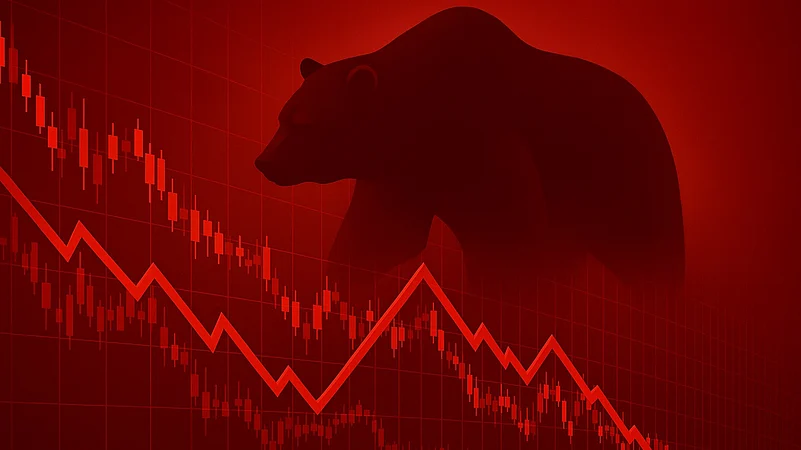US Attacks Iran: Domestic stock market tumbled in trade on Monday, June 23 as investors reacted to United States' (US) attack on Iran’s key nuclear sites, raising fears of further escalation in the Iran-Israel war. The Sensex fell 511.38 points, or 0.62 per cent, to close at 81,896.79, and the Nifty 50 lost 140.50 points, or 0.56 per cent to settle at 24,971.90.
As a knee-jerk reaction, the headline indices fell over 1 per cent each in early trade. During the session, the Sensex fell 931.41 to hit an intraday low of 81,476.76, and the Nifty 50 fell 287.55 points to touch an intraday low of 24,824.85. However, sentiment quickly turned around as brent crude prices eased, helping the headline indices recover most of their early losses by the end of the session.
Vinod Nair, Head of Research, Geojit Investments, said, "Despite the initial setback, the market recovered most of its losses, supported by gains in capital goods and metal stocks, as fears of an immediate oil supply disruption remained low."
The broader market indices showed mixed reaction. The Nifty Midcap 100 gained 0.36 per cent, and the Nifty Smallcap 100 advanced 0.70 per cent. On the other hand, the Nifty 500 index, which represents about 92.3 per cent of free float market cap of all the NSE-listed stocks, slipped 0.17 per cent. Nifty Microcap 250 index, which comprises of top 250 companies beyond the Nifty 500 constituents, ended 0.26 per cent higher.
IT Drags, Media Emerges Top Sectoral Gainer
On the sectoral front, Nifty IT emerged as the top loser, falling 1.48 per cent, followed by Nifty Auto, which fell 0.92 per cent.
Nair said, "IT stocks came under pressure due to uncertainty around global tech spending, exacerbated by weak earnings reported by Accenture."
Nifty FMCG too declined 0.74 per cent. Among other major sectoral indices which closed in the red were Nifty Bank, Nifty Financial Services, Nifty Private Bank, Nifty PSU Bank, Nifty Realty, and Nifty Healthcare.
On the other hand, the Nifty Media index emerged as the top gainer, rising 4.39 per cent. Nifty Metal and Nifty Consumer Durables were also among the gainers.
Nifty Energy, Nifty Pharma, and Nifty Oil & Gas closed flat with positive bias.
Sensex, Nifty 50: Top Gainers And Losers
21 stocks from Sensex's 30 stocks closed in the red. Among the top losers were Infosys, Larsen & Toubro (L&T), HCL Technologies, Mahindra & Mahindra (M&M), Hindustan Unilever, Tata Consultancy Services (TCS) and Power Grid Corporation. Capping the losses were Trent, Bharat Electronics (BEL), Bajaj Finance, Kotak Mahindra Bank, Bajaj Finserv and Eternal.
From the Nifty 50 index, Infosys, HCL Technologies, L&T, Hero MotoCrop, M&M, TCS and ITC led the losses, while Trent, BEL, Hindalco, Tata Consumer Products, Bajaj Finance, Coal India, and Adani Enterprises were the top gainers.
Key Cues To Watch Tomorrow, June 24
Iran-Israel War: The Iran-Israel conflict entered its 11th day with no clear signs of easing, especially after the recent US strikes on Iran’s nuclear sites.
Iranian military leaders have warned of retaliation, saying the US will face consequences. Meanwhile, US President Donald Trump hinted at the possibility of regime change in Iran through a social media post. Iran’s Supreme Leader Ayatollah Khamenei has yet to respond publicly.
Investors will keep a close watch on this space for any new development.
Crude Oil Prices: Since the Iran-Israel war started on June 13, the widely-traded brent crude futures rose as much as 14 per cent to touch a five-month high of $79.25 per barrel. However, from the previous two sessions, oil prices have eased and is currently trading around $75.8 per barrel.
Kaynat Chainwala, AVP–Commodity Research at Kotak Securities, noted that Iran’s parliament voted on Sunday to close the Strait of Hormuz, a critical oil transit route that handles nearly 20 per cent of the world’s crude supply. While the proposal still needs approval from the Supreme National Security Council and the Supreme Leader, any disruption to the strait could send oil prices soaring and cause ripples across global energy markets. However, Chainwala pointed out that such a move could be counterproductive for Iran itself, as more than half of its own energy exports also pass through the same route.














